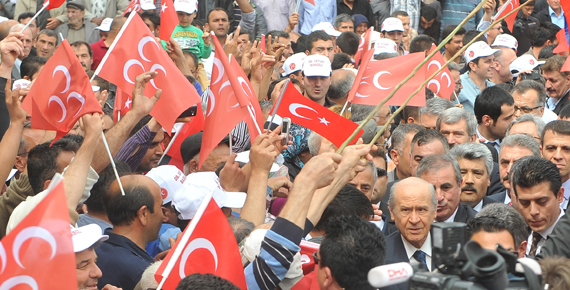The AK Party’s role in the resolution of the Kurdish issue and the disarmament of the outlawed Kurdistan Workers’ Party (PKK) is an unprecedented political experience. In the past, center-right parties avoided even articulating the issue, let alone initiating a resolution process. The efforts of the only right-wing politician who faced the issue, Turgut Özal, were wasted by the PKK and the state’s provocations. Another name from the right wing, Necmettin Erbakan, not only lacked a policy plan beyond criticizing the nation-state publicly, but, having been forced to step down by a coup, never had time to do anything about it. In the 1990s, a social democrat party, The Socialist People’s Party (SHP), took courageous steps, published the first reports on the issue and was instrumental in bringing the issue to the floor of the Parliament. Nevertheless, under the political circumstances at the time, the SHP surrendered to the tutelage regime. Since then, the performance of both left-wing and social democratic parties on the floor has been no less harsh than the ultranationalist political movements. As such, it could be stated that the leftists and the social democrats’ stance on the issue displayed the most radical ups and downs. Consider this tragic example – the Republican People’s Party (CHP), the modern-day extension of the party that prepared the most progressive report the political conditions allowed on the Kurdish issue in 1989, has voted “no” on the bill that would grant the right to a court defense in one’s mother tongue.
A far-right party, the Nationalist Movement Party (MHP), owes its post-1980 existence to a great extent to the Kurdish issue and the terrorist acts of the PKK. In the early 1980s, as the political parties had just begun to come back to Parliament, the MHP became stuck between the center-right political winds of Özal and the steadily rising Islamist movement of Erbakan. Had it not been for the PKK’s armed existence and the debates over the Kurdish issue, the MHP could have been left behind in the 1980s. Around the same time, as a response to the tutelage regime’s repressive policies, the Kurdish nationalist movement also began to rise. The Kurdish political movement, which could not form an independent political party before 1980, began to form political parties based on Kurdish nationalism as a result of the Kurdish issue turning bloody after the coup. The political party that represented the Kurdish political movement became the target of the military-judiciary tutelage regime, which frequently tried to close the many incarnations of the movement’s parties.
The center-right and the center-left parties, which tried to avoid the identity demands and any act of straying outside the red lines drawn by the nation-state, never really seriously brought the Kurdish issue to the floor. The Kurdish issue avoided by the center parties became the most important item for identity-based political parties. The Islamist, Kurdish and Turkish nationalist parties became the most ardent entities discussing the issue. Although supported heavily by the Kurds, Erbakan hesitated to blatantly oppose the regime by stepping outside the red lines. Nevertheless, he continued to articulate that Kurds were being oppressed. On the other hand, the MHP, having reduced the Kurdish issue to a PKK issue, turned into the sternest voice for the nation-state. The Kurdish political movement, as a reaction to the oppressive policies, transformed the struggle it began on more democratic premises into becoming the political wing of the PKK. I will continue to examine each party’s stance on the Kurdish issue from there on.
[Hurriyet Daily News, May 3, 2013]








